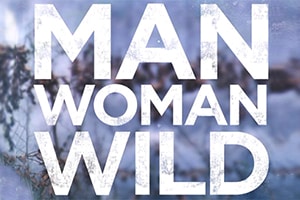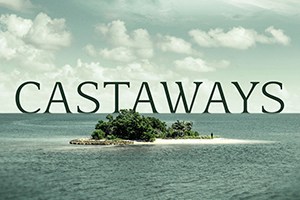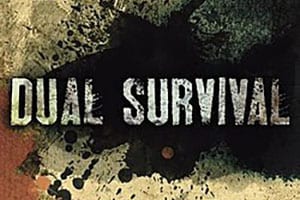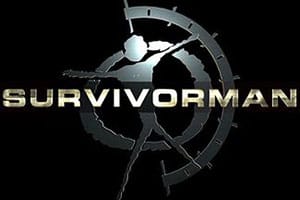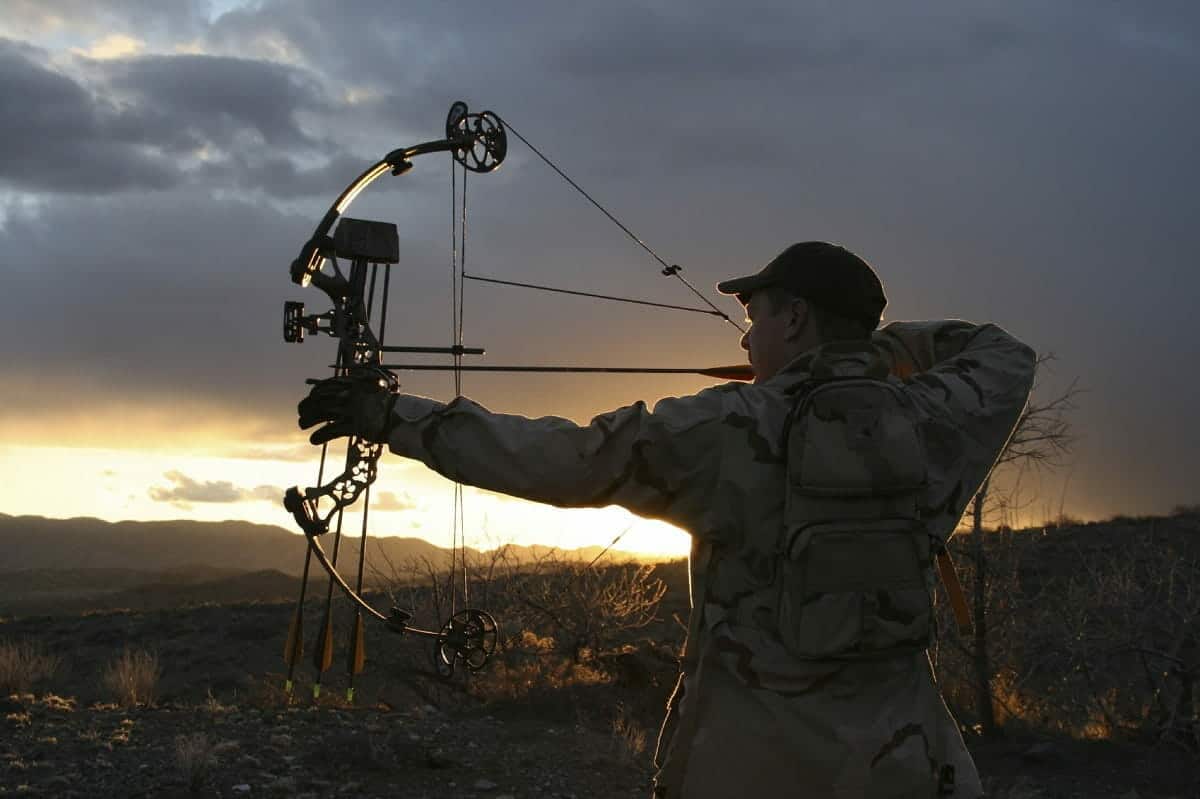A survival show is a kind of ‘reality’ TV show that typically pits a person, couple or team against a seemingly hostile natural environment. In most cases, the goal is for the person or couple to live off the land for a given amount of time using only their wits and a few simple tools. Shows that feature teams or large groups are typically focused on seeing who can last the longest in the wild.
Survival shows can trace their roots to the 1990s, but the idea did not really take hold in the public consciousness until ‘Survivor’ hit the airwaves in 2000. While not a true survival show Survivor did spawn numerous shows that sought to reduce the theatrics and focus more on practical ways a person might survive if lost in the wilderness.
20 years ago survival shows were the exclusive domain of network TV. Today they can also be found on cable stations like Discovery, streaming services like Amazon and even Youtube. Some of these are new productions but many are reruns. Below are the best survival shows of 2022.
1. Doomsday Preppers
National Geographic is no longer producing new episodes of Doomsday Preppers. But the show retains a loyal following mostly because it eschews manufactured rainforest-type ‘drama’ in favor of real world scenarios about what to do if the SHTF. There are no shots of snakes you know are not going to bite anyone. Instead, the protagonists are tasked with demonstrating how they would handle everything from a nuclear apocalypse to total societal breakdown.
There were a lot of people who secretly (and not so secretly) snickered about the ‘wackjob’ doomsday preppers stocking their bunkers with 20 years worth of food. But once coronavirus hysteria took hold, many of those same skeptics could be found standing in line at the big box with shopping carts full of toilet paper, or discreetly ordering emergency food supplies from Amazon. So, although the show is not currently in production, it turns out to be more relevant than ever.
2. Marooned with Ed Stafford
Ed Stafford and his guide Gadiel Sánchez Rivera were the first people to hike the length of the Amazon River. On the basis of that highly publicized accomplishment Stafford was given the opportunity to produce several survival shows. ‘Marooned with Ed Stafford’ was a Discovery Channel production in which Stafford was set down in various remote locations to see if he could survive for 10 days without food or modern tools. During the first challenge he was also naked.
The show does a good job selling the idea that Stafford is heading into the unknown with each new adventure, even though every location has been thoroughly examined and approved ahead of time. It is interesting to see how he solves the various challenges and the locations are always engaging. Also, not having a cameraman with him goes a long way toward selling the idea of isolation.
3. Man Woman Wild
Man Woman Wild originally ran from July 2010 to January 2012 on the Discovery Channel but has found extended life in syndication and on the Discovery Channel’s website go.discovery.com. The show features former Army Ranger Mykel Hawke and his wife, Ruth England, who are challenged to survive for X number of days in any one of a variety of hostile environments. They are never alone (the ever-present cameraman kills that idea), but the situations are often engaging, the locations interesting, and Hawke definitely knows his stuff.
A major theme of the show was Hawke trying to teach his journalist wife various survival techniques. These, of course, changed from show to show depending on the location. But the dynamic between the two was always lively and sufficient for those looking to get a personality fix. Two years after calling a halt to production because it was too hard on their family, Hawke and England returned with a new show (Lost Survivors) in a similar format.
4. Man Vs Wild
Man Vs Wild has more official names than you can shake a divining rod at. But we’ll stick to the one that is most familiar to American audiences. The show features British Special Forces veteran Bear Grylls and was originally produced for the Discovery Channel starting in 2006. Grylls may be the most experienced and qualified of the TV survival experts, having taught combat survival, winter warfare tactics and more during his tenure in the Special Forces.
The show features different locations into which Grylls is dropped, along with a film crew. Those locations include the rainforest of Borneo, the South Island of New Zealand, Iceland, Northern Australia and more. Grylls is not competing against a clock or bickering with other team members. Instead, he’s using each location to demonstrate a different set of survival skills. The helicopters, medical team, and technical support staff are never far away, and that’s okay.
5. Alone
Alone is a survival show, but not one that centers on the exploits of a survival expert. Instead, 10 contestants are given 10 basic survival implements – including a multitool, some fishing hooks and line, some rope, a cooking pot and a backpack – and dropped into a hostile environment. Whoever manages to last the longest wins half a million dollars. In the latest season the prize has been upped to 1 million dollars.
Unlike many other shows the participants actually spend time isolated. They do all the camera work themselves and their only contact is when the doctor arrives from time to time to give them a physical. If the doctor finds any problems they are disqualified. In survivalist terms they are given quite a bit of equipment. But since these are not people with long years of special forces training they typically need every tool they can get their hands on.
6. Castaways
Castaways is similar to Alone but introduces a more elaborate narrative twist. The contestants are stranded on various deserted islands with only a piece of luggage that may be theirs, or may belong to another contestant. Each piece of luggage contains someone’s journal, which becomes a point of interest during the show.
What contestants may not know is that other castaways may be nearby. It all adds up to some wacky Lost-style hijinx that some people will love and others will loathe. We find it harmless fun and give the producers some extra credit for at least trying to breathe some new life into the genre.
7. Ray Mears Extreme Survival
Ray Mears is a certifiable big deal when it comes to survival media in the UK. He has hosted numerous shows featuring his adventures in various remote parts of the world for over 20 years and is a pioneer in the field of bushcraft. Or at least, in the field of enlightening the British masses about bushcraft.
Mears’ Extreme Survival series shines a spotlight on his bushcraft skills. Episodes were filmed in such far-flung locales as Costa Rica, Morocco and the Australian Outback. Although it has been nearly 20 years since this series folded its tent, it is still worth a look.
8. Dude You’re Screwed
In ‘Dude You’re Screwed’ a group of survival experts – some genuine, some self-proclaimed – challenge each other to survive in remote locations. They seemingly go out of their way to find the nastiest, most remote places to saddle their contemporaries with. And it is fun to see the reactions when those new locations are revealed.
The show offers plenty of personality-driven nonsense, but also serves up a heapin’ helpin’ of good old fashioned wilderness survival tips. And the diversity of locales means it hardly ever gets boring or repetitive.
9. Dual Survival
Dual Survival is a product of the Discovery Channel that features a pair of survival experts testing their wits and wherewithal against nature. For the first few seasons the formula was to drop Dave Canterbury and Cody Lundin into an isolated location (a remote island, a tropical jungle, etc.), and see if they could survive for X amount of time. Fan interest was largely driven by the different approaches the two would take to various situations.
We would rank the show higher if it were not for the fact that one of its protagonists was defrocked when it was discovered he had essentially invented his entire military history. That protagonist would be Dave Canterbury and he was released from the show when his deception was revealed. In 2014, his former partner, Cory Lundin, was also released from the show. This time over concerns by the producers that he was reckless.
10. Surviorman
Survivorman was the brainchild of one Les Stroud, a Toronto garbage collector and one-time aspiring music industry employee who decided to make a career change and become a survival expert. He did a remarkably effective job of it and wound up with his own survival show that set the bar for most of those that followed.
Stroud pretty much created the template of scouting a location, laying out the beats of the episode ahead of time then having himself dropped in with a camera while the support team stayed a modest distance away in case anything went wrong. And if nothing else, Stroud proved just how much you could do with a multitool.
FAQs
What Is Survival Show?
A survival show is a show that airs on network TV or a streaming service that chronicles the exploits of a person or persons as they expose themselves to some of the world’s most dangerous or remote natural habitats. The premise is typically to see if the person, couple or team can survive for a set amount of time with only a bare minimum of tools to help them.
In the case of group survival shows, participants are typically eliminated when they have had enough and elect to quit. The last man or woman standing is the ‘winner’. Most true survival shows, however, have more to do with highlighting the various survival skills of the host or hosts, than they do with pitting people against each other and determining a winner.
Who are the People on These Survival Shows?
Some are self proclaimed survival ‘experts’ from a variety of backgrounds. Others have long resumes that include the American or British Special Forces, actual combat experience, and specialized training in a variety of survival techniques. Here’s a sampling of some of them.
Les Stroud – Les Stroud of ‘Survivorman’ fame worked for the Canadian music video channel MuchMusic (1), and was a garbageman for the City of Toronto before deciding he wanted to dedicate his life to outdoor pursuits. He taught himself most of what he knows regarding survival, and learned the rest by taking various survival courses, and as part of his job leading tour groups on canoe excursions. His show ‘Survivorman’ was pitched to the Discovery Channel as a more realistic version of the American mega-hit ‘Survivor’.
Dave Canterbury – Dave Canterbury of ‘Dual Survivors’ fame had a military background and worked for a time as a commercial diver and fisherman. His survival expert credentials have long been the subject of debate, and he was actually fired from Dual Survival when producers discovered he lied about his military resume. And it wasn’t just some little white lie. He claimed to have 20 years of military experience as an Army Ranger (2), with Airborne training, scout training and specialist survival training. He also claimed to have served in the jungles of Central America. Not so. Actually, he spent 6 years in the regular army with one of those years spent in Korea.
Bear GryllsAt the other end of the spectrum from Dave Canterbury you have Edward Michael Grylls. Better known as Bear Grylls. Bear has his detractors, those who believe him to be a bit of a ham. But, regardless of what you think of his TV persona, Bear was a bona-fide member of the British Special Forces (3) and served for years as a survival instructor. He is trained in combat survival, winter warfare, unarmed combat and more. He has also been awarded an OBE (Officer of the Most Excellent Order of the British Empire) by the British government. So his ‘expert’ credentials are about as genuine as they get.
Mykel HawkeMykel Hawke is another military veteran with an impressive resume. He is a combat veteran and was a captain with the US Green Berets (4). He has frontline experience training UN Peacekeepers in various African theaters of operation, and performed search and rescue missions in Columbia during the drug wars of the late 20th century. He is a trained Special Forces Medic, communications expert and Intelligence Operations expert. He also speaks 7 languages and holds multiple black belts in the martial arts.
Laura Zerra – Laura Zerra is best known for star turns on the Discovery Channel’s ‘Naked and Afraid’ and ‘Naked and Afraid XL’. Although she has garnered quite the dedicated following, Laura survivalist credentials amount to lots of enthusiasm and lots of time teaching herself how to tan the hides of roadkill she’d collect. Laura exists in a grey area between the wannabe celebrities who populate ‘Survivor’ and those with decades of military survival training and combat experience. To her credit, however, Laura has not claimed to be anything she is not.
EJ Snyder – EJ Snyder spent 25 years in the US military where he was an Army Ranger. He attended the Army’s survival school, and eventually became a Ranger survival and tracking instructor. He saw combat in the 1991 Gulf War and during the 2004 invasion of Iraq. Snyder augmented his Army survival training on his own time and, after leaving the service, began appearing on various survival shows including ‘Naked and Afraid’ ‘Man vs Amazon’, ‘Naked and Afraid XL’, and ‘Dual Survival’. Snyder goes by the nickname ‘Skullcrusher’ and tends to be either loved or hated by TV audiences for his hard-bitten personality.
Ray Mears – Ray Mears is extremely popular in the UK and has gained a significant following Stateside as well. He is best known for his survival shows including ‘Ray Mears World of Survival’, ‘Wild Britain with Ray Mears’, and ‘Wild River with Ray Mears’. He also owns and operates a bushcraft (5) store in the UK called ‘Woodlore’ that sells gear and conducts bushcraft-related courses. The thing about Mears is that he’s another survival personality whose bona-fides some will call into question. Most of his bushcraft (and survival expertise in general) is self taught. Does this mean he doesn’t know what he’s talking about? No. But if you prefer your survival experts to have a thick military resume, Mears is not the guy.
The bottom line is that the people hosting, or who are otherwise the focus of these shows, come from a variety of backgrounds.
Are The People on Survival Shows Ever Actually Alone?
A few may spend some time in relative isolation, but most are accompanied by film crews, medics and other support staff. The easiest way to determine if a person is actually alone is to ask “Who’s holding the camera?” If the survival expert is being filmed from several feet away and the camera is moving with him or her, then an unseen third party is present, holding that camera.
Les Stroud of Survivorman came closer than most to actually being alone. He typically operated the camera himself, setting it up on a tripod or some other surface, or holding it to get a shot of something of particular interest. Still, he was not alone in the strict sense of the word, because, unlike people actually lost in the wilderness, Stroud always had a large support crew a few miles away ready to respond to any calls for help.
Are People on Survival Shows Really Dropped Into Isolated Areas They Know Nothing About?
As is the case with most other things in life today, nothing occurs on a survival show that does not have the okay of the production company’s insurance company. Why? Because of a little thing called ‘liability’ (6). If a production company just out of the blue up and dropped someone in the middle of nowhere with a folding saw and a compass, and that person died of exposure, or fell off a cliff, their family could sue the production company back to the stone age.
So, no one is sent anywhere without the candidate location being thoroughly scouted ahead of time. Everything is checked out from the plant life, to the types of insects, spiders, snakes, fish and birds found there. The type and population of various dangerous predators, if any, is also considered. Exact routes are scouted and laid out, timelines established, vaccinations given when necessary and precise evacuation protocols created. As little as humanly possible is left to chance because a lack of preparation and lawsuits go hand in hand.
But liability isn’t the only concern for producers. They also want to make sure they can maintain complete control over what is happening to the people on camera. To that end they sometimes choose less than challenging locations. For instance, Naked and Afraid once shot in the Florida town of Sorrento. Turns out Sorrento is a town of about 1,000 people and is only a few hours walk from Disney World in Orlando. Another time N&A shot in the Brazilian rainforest, so close to a nearby town that participants could hear music and see kids playing soccer. And even a show like Ed Stafford: Naked and Marooned only happens after the island he’s eventually dropped on has been thoroughly vetted.
Is “Survivor” a Survival Show?
Survivor can trace its origins back almost 30 years. It was the brainchild of a producer named Charlie Parsons (7) who shopped it around but did not find any takers right away in Hollywood. Eventually the idea was picked up in Sweden in 1997 and produced under the title ‘Expedition Robinson’. After that show had some success the ‘Survivor’ idea finally gained traction in the US.
You would certainly think from the name that Survivor is a survival show. But a more accurate name for it would be something like ‘Clash of the Personalities’. It has virtually nothing to do with actual survival skills, bushcraft, living off the land or anything else that is necessary to survive if one were lost in the wilderness. What it does have to do with is backbiting, backstabbing, undermining your opponent and ‘winning’. So, no. Survivor is not a survival show.
The Bottom Line
Survival shows are entertainment. No one is ever dumped into a hostile, completely unknown wilderness and told to fend for themselves. Even the hard-boiled special forces vets who spent years dodging IEDs in Iraq are not allowed to take chances. Everything is planned, scripted and tested ahead of time before the cameras ever start rolling.
So what you get out of a survival show depends on what expectations you bring to it. If you expect a modern Lewis and Clark expedition (8) you are going to be disappointed. But if you want to learn a thing or two about surviving if you ever get lost on a hunting or hiking trip, people like Bear Grylls, Mykel Hawke or Ray Mears may have something to teach you. If you are primarily interested in manufactured drama and personality clashes there are plenty of shows that cater to that kind of narrative as well.


